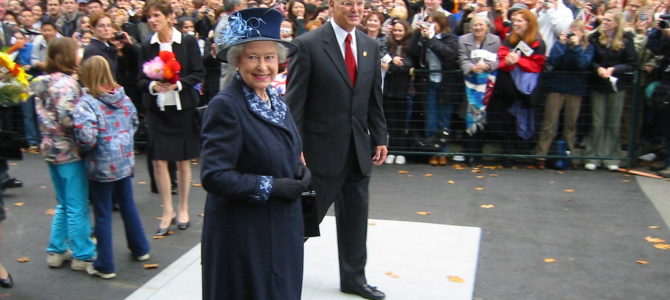
Not for the first time in the ongoing debate, the Brexit discussion turned on obscure-but-meaningful procedural questions Wednesday. For those wondering where the word “prorogation” suddenly came from, herewith an explanation about what it means, and why it matters.
What happened?
Queen Elizabeth II, acting on the advice of new Prime Minister Boris Johnson and his government, agreed to a request to prorogue, or suspend, Parliament from the week of September 9 through October 14.
What does prorogation mean?
During prorogation, Parliament will not sit or vote on legislation. However, prorogation will not prompt a general election—the queen would have to dissolve Parliament entirely should an election be called. Prorogation ends a session of Parliament, just like Congress ends its session at the end of the year, and reconvenes for a new session in January.
One big difference, however: Whereas Congress decides itself when to end one session and reconvene another, prorogation remains a royal prerogative, exercised by the queen herself on advice of ministers.
Is this prorogation normal?
Yes—and no. Each parliamentary session normally lasts about one year, but the current session has gone on for more than two, since Theresa May called a snap general election in the spring of 2017. Calling a new session of Parliament through prorogation therefore seems overdue.
Moreover, Parliament generally stops work for several weeks in the autumn, as the major political parties (Conservatives, Labour, and Liberal Democrats) have their annual conferences. Some would argue that this prorogation merely suspends Parliament at a time when it wasn’t scheduled to sit anyway.
Why isn’t this prorogation normal?
The duration of this prorogation means Parliament will not have a say on matters for a longer period than usual. Whereas the last two prorogations lasted for four and 13 business days, this prorogation could last for as many as 25 (although Parliament was not due to sit for most of those days, as noted above).
Why does prorogation matter?
Herein lie the real objections to Johnson’s request for a prorogation. Brexit opponents believe that he asked for an extended suspension of Parliament to prevent them from thwarting his plans for a “no deal” Brexit.
Under current law, Britain will leave the European Union on October 31, having delayed its original Brexit date of March 29. Johnson, who took office as Parliament left for its summer holidays, has pledged that Brexit will happen on October 31 “come what may”—meaning whether the United Kingdom and European Union agree on an exit deal or not.
The opposition parties in Parliament, along with some members of the ruling Conservative Party, oppose a “no deal” Brexit, believing it will cause both temporary chaos and lasting damage to the British economy. An extended prorogation reduces their chances to amend current law, or take some other action, to prevent “no deal.”
What was the reaction?
Swift. A petition opposing prorogation attracted more than 1.1 million signatures as of late Wednesday (early Thursday London time). Speaker of the House of Commons John Bercow—who by custom normally stays above politics—attacked the move as a “constitutional outrage.” Philip Hammond, a senior Cabinet official in May’s government only a few weeks ago, called it “profoundly undemocratic,” and former Conservative Prime Minister John Major said Johnson wanted to “bypass a sovereign Parliament that opposes his policy on Brexit.”
By contrast, Conservative MP and Brexiteer Peter Bone supported Johnson’s prorogation. Bone said he would have opposed any move by Johnson to prorogue Parliament past October 31—i.e., preventing lawmakers from weighing in at all on Brexit—but called Johnson’s request of the queen “absolutely standard procedure.”
What are the fundamental arguments?
At its core, the debate involves about not just Britain’s future relationship with the rest of Europe, but the tension between representative and direct democracy. Johnson can claim—with validity—that he is acting to express the will of the people who voted to leave the EU, as well as the voters in the Conservative Party who just voted for him as leader, in full knowledge that Johnson would not take “no deal” off the table. His opponents can claim—with validity—that Johnson is trying to clip the wings of Parliament, to make it less likely that dually elected lawmakers can have their say.
In this case, however, both sides’ claims have merit. The British people voted to leave the European Union in 2016. But the Parliament that the British people voted for one year later doesn’t want to leave the EU without a deal, and many opposition party members don’t want to leave the EU at all. That dilemma has led to the deadlock whereby Parliament doesn’t approve of “no deal,” but can’t agree on a Brexit deal that can command a majority of members’ support.
What happens next?
Parliament will return from its recess next week, with only a handful of days until prorogation. Opposition parties have said they have a strategy: They will seek to wrest control of the parliamentary timetable—quite possibly with Speaker Bercow’s assistance—and pass legislation blocking “no deal.”
Labour leader Jeremy Corbyn prefers a motion of no-confidence in Johnson’s government, which would (in his view) lead to him becoming a caretaker prime minister for the purposes of calling a fresh general election. However, Corbyn’s views have become so toxic to other opposition parties that they have called his ascension to the premiership (however brief) as a “last resort” to stop “no deal.”
Whether in votes on legislation, a no-confidence motion, or both, Parliament will weigh in on Britain’s role in Europe, the constitutional principles of British democracy, and could even short-circuit Johnson’s nascent premiership. The coming week could thereby prove the most consequential in British politics since the Narvik debate in May 1940 that ended with Winston Churchill becoming prime minister.









